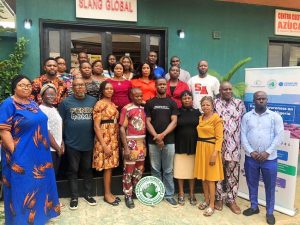International Climate Change Development Initiative (ICCDI Africa), a Lagos-based environmental organisation, recently organised an insightful workshop in Enugu, Nigeria, aimed at educating local government stakeholders on effective emission reduction strategies. The workshop, held on July 12, 2024, brought together key representatives from Enugu North, Enugu South, Enugu East, and Nkanu West.

The event began with an opening address by the Executive Director of ICCDI Africa, Olumide Idowu, who highlighted the urgent need for collective action to combat climate change and its detrimental effects on the environment. Idowu emphasised the importance of reducing greenhouse gas emissions and implementing sustainable practices to safeguard the planet’s future.
During the workshop, experts delivered engaging presentations on emission reduction strategies tailored to the specific context of Enugu LG. These strategies encompassed a range of sectors, including transportation, energy, waste management, and agriculture. Participants gained valuable insights into the potential impact of adopting sustainable practices in these areas and the benefits they can bring to the local community.
In recent times, ICCDI Africa organised a workshop that lasted for two days and was attended by stakeholders from a variety of local government areas in the state of Enugu. The objective of the workshop was to achieve a greater level of awareness regarding climate change and the reduction of emissions.
Stakeholders from the local government areas of Enugu North, Enugu South, Enugu East, and Nkanu West participated in the workshop, which was a collaborative effort to solve the knowledge gap about the mitigation of climate change. This exhibited a commitment to combating climate change that was shared by all parties. Those local governments who were chosen to participate in the workshop were also given the opportunity to incorporate net-zero initiatives into their respective climate policies and programmes.
Furthermore, the workshop showcased successful case studies from other regions successfully implementing emission reduction strategies. These case studies inspired Enugu LG stakeholders and demonstrated that positive change is attainable with the right mindset and commitment. The workshop also facilitated networking opportunities, allowing participants to establish connections and explore potential collaborations for future sustainability projects.
Idowu brought attention to the fact that certain states were exhibiting a disregard for the challenges that are associated with climate change. It was also claimed by him that a significant number of stakeholders did not understand climate change and the decrease of emissions. He emphasised the significance of properly disseminating information to populations in the surrounding area, so that they can acquire a solid understanding of how we can take action on a local level to assist in the development of our communities.
Idowu reiterated that the session’s primary goal was to make the reduction of emissions more understandable. The aim was to raise awareness among the stakeholders of local governments about the challenges of climate change and the importance of reducing emissions.
According to him, this particular endeavour is a part of a larger programme that includes workshops of a similar sort in the states of Gombe, Jigawa, Kaduna, Bauchi, Benin, Lagos, and Abuja. He indicated that this particular endeavour is a component of the larger scheme. Additionally, he intends to collaborate with the Association of Local Governments of Nigeria (ALGON) to bridge the knowledge gap about climate change and the most effective measures to address inherent environmental concerns.
Idowu mentioned that the work that they had done in Igbo-Etiti the year before had resulted in the creation of a plan of action to investigate the possibility of working together to provide solutions to the problems that are caused by climate change in the state of Enugu. This plan was developed in an effort to pursue integrated measures that would promote solutions at the grassroots level.
The participants, who included the chiefs of health, agricultural, and environment departments in various local government areas, expressed their gratitude for the workshop, pointing out that it provided them with useful insights into preserving the environment in their respective regions.
“Involving local governments in the process of incorporating net-zero strategies into local climate policies and programmes improves the efficiency, relevance, and inclusiveness of climate action, which ultimately results in a future that is more sustainable and resilient for communities,” they chorused.
In conclusion, the workshop in Enugu LG served as a vital platform for educating LGAs on effective emission reduction strategies.
By Olumide Idowu, Executive Director, ICCDI Africa
